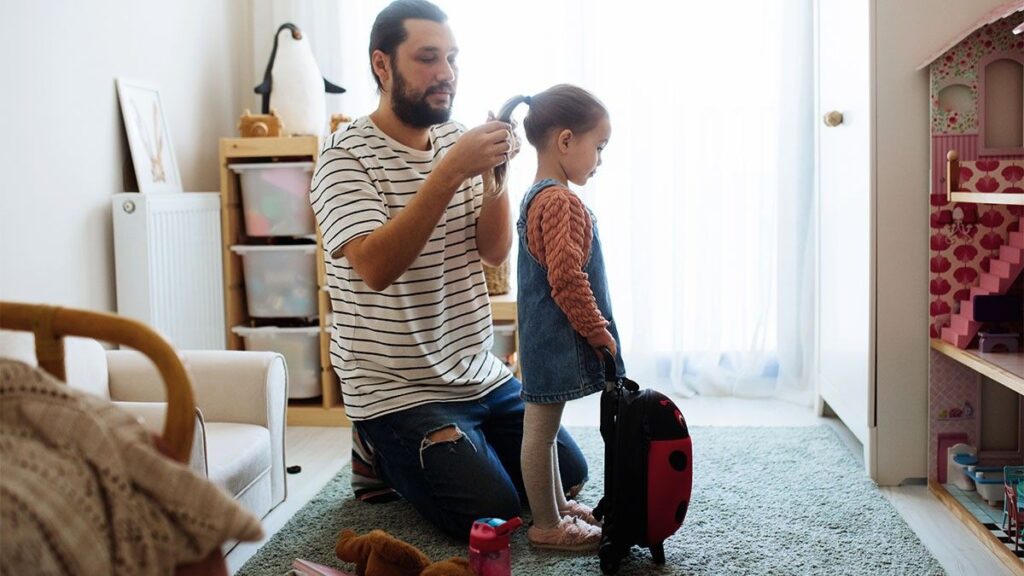
Getty Images
It’s common sense that it’s illegal to discriminate against families with children when it comes to housing. However, refusing to rent or sell a home to a single parent or couple with kids—or even barring kids from using building amenities, such as a pool—remains a persistent problem even today.
The federal Fair Housing Act makes it illegal to treat families and pregnant individuals differently or unfairly or exclude them from equal rights and protections across the country. Familial status protection was added in 1988, 20 years after the act was passed to end housing discrimination based on race, color, national origin, and religion. Disability and sex, which includes sexual orientation and gender identity, have since been added as protected classes.
However, families are still fighting to be treated equally.
Housing discrimination based on familial status was the fourth most common type of complaint filed in 2021 with nonprofit fair housing organizations and government agencies, including the Department of Housing and Urban Development, according to the National Fair Housing Alliance’s 2022 Fair Housing Trends Report.
Discrimination based on familial status made up about 7% of all complaints, according to the report, which analyzed the most recent housing discrimination complaint data.
“I have interviewed and worked with many, many people who’ve been the victims of housing discrimination because they have children,” says Pam Kisch, executive director of the Fair Housing Center of Southeast & Mid Michigan in Ypsilanti. The organization has received more than 4,000 complaints since it was founded 13 years ago and has helped file more than 100 lawsuits.
“I think that people were unfairly being denied housing because of stereotypes about children, that children will be noisy or destructive,” says Kisch.
Families are illegally being denied housing

Getty Images
This type of discrimination can make it more difficult, and sometimes even more expensive, for families to secure housing.
Kisch’s organization worked with a single parent who was denied a lease on a one-bedroom apartment because the landlord believed the parent and child should not share a bedroom.
While local jurisdictions adopt health and safety codes to cap the number of people who can live in a space, Kisch says some landlords are imposing unreasonable occupancy standards.
“Your landlord doesn’t tuck you in at night and has no business telling you who sleeps where,” says Kisch.
Her organization also handled a case involving a single parent of two children who was denied a two-bedroom apartment because the landlord said a brother and sister over the age of 5 could not share a bedroom.
Housing attorney Scott Moore says he commonly sees signs at apartment complexes that say “No kids running in the hallways.”
Instead of targeting children with a discriminatory sign, Moore points out, simply changing the sign to “No running in the hallways” achieves the same effect.
Much of the familial status discrimination he has seen is due to an assumption that children are responsible for destroying peace and quiet.
“I will say that in multifamily housing where people are living close together … it’s not surprising that there was this kind of discrimination,” says Moore, a partner at Baird Holm in Omaha, NE. “A lot of it may not be invidious like ‘we don’t want families here,’ but rather ‘we don’t want to deal with noise.’”
Discriminating against children is also illegal
It’s not just denying housing to families with children or putting up signs that target them that might be deemed illegal. Refusing to allow children who live in a building to use its amenities can also be considered discrimination.
HUD recently announced a $3 million settlement against a California property management company and more than 30 apartment complex owners. They were accused of refusing to allow children to play outdoors on the property and requiring parents to supervise kids under 14 in common areas.
In March 2023, the National Fair Housing Alliance joined the Southwest Fair Housing Council and three tenants to file a familial status–based discrimination complaint against X Co. The Chicago-based firm owns and operates apartment buildings across the country with all sorts of luxe amenities such as pools, gyms, and community workspaces with private offices.
Robertson Smith is one of three tenants who filed the complaint against X Phoenix. He signed a lease in February 2022 specifically because of the amenities that are available to residents. But eight months into his lease, the management at X Phoenix notified all residents that kids were no longer allowed to use the amenities.
Even though Smith and his daughters have since moved out of X Phoenix, he joined two other tenants with children to file the complaint.
This type of discrimination makes families with children feel like second-class citizens and limits their housing choice, says Morgan Williams, general counsel for the National Fair Housing Alliance.
“Many families with children specifically choose housing based on amenities such as access to a pool,” Williams says.
The X Co. did not immediately respond to requests for comment regarding the complaint.
The post Housing Discrimination Against Families With Children Is More Common Than You Might Think appeared first on Real Estate News & Insights | realtor.com®.
